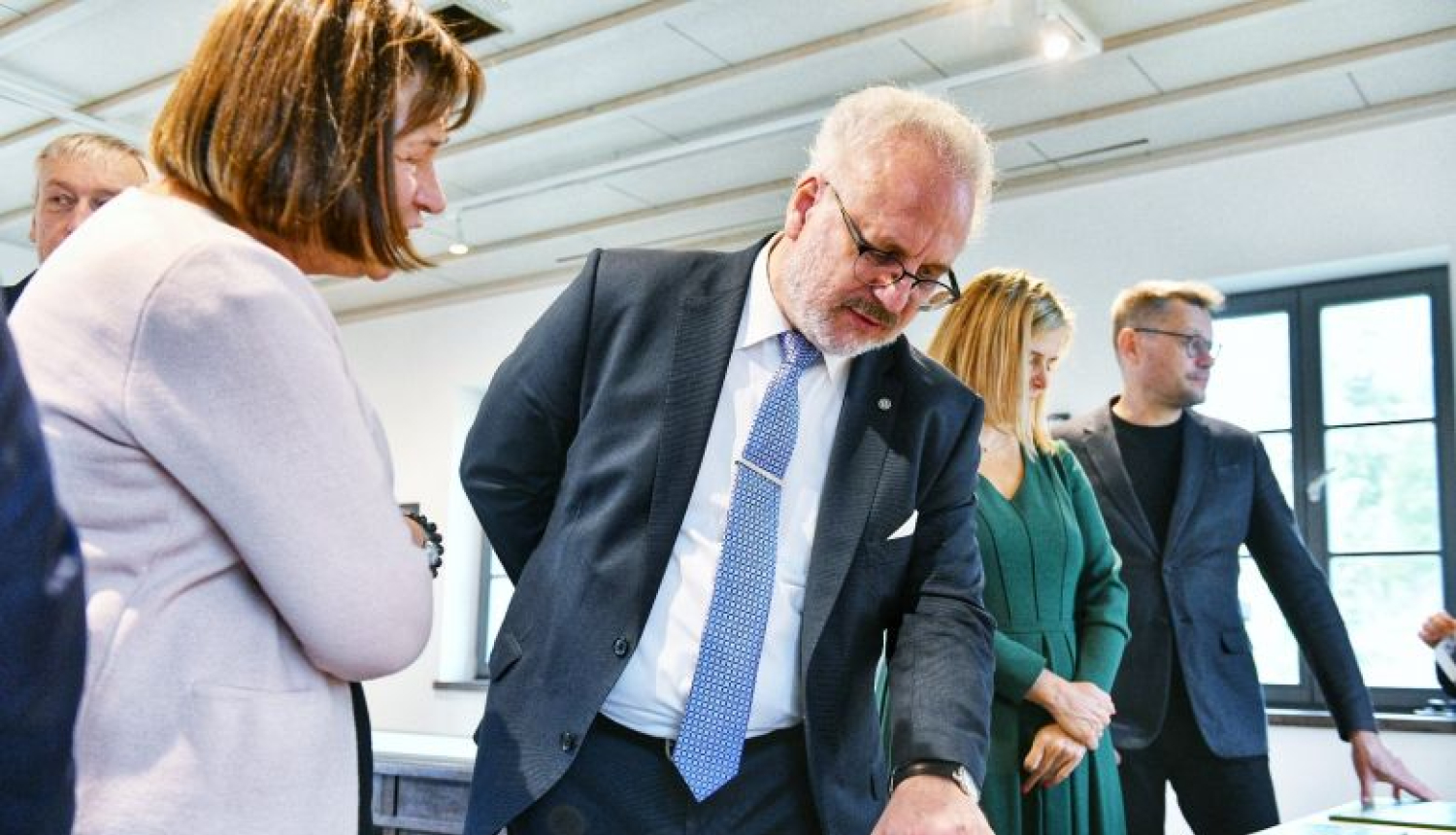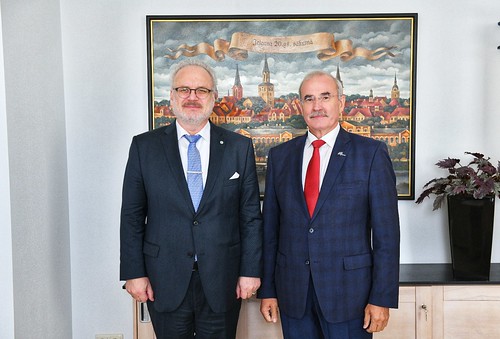Dear friends,
I was here 15 years ago when the construction of this centre began. Essentially, museum has two roles. Firstly, it is a place commemorating and honouring the first president of Latvia, Jānis Čakste. Secondly, this centre embodies the ideals followed and embraced by Jānis Čakste. Ideals like independence, freedom and democracy.
This is a very congenial place. It is where history meets the present. No doubt, a place where we can see the ideals and values he followed in his work through the historic importance of the person and his living and working conditions. These ideals and values have transcended into today as constitutional principles. These ideals and values have been integrated into the Constitution of Latvia, Satversme. Jānis Čakste was one of its authors and his touch can be traced throughout the document.
If you take a look at the Constitutional Assembly transcripts, you will find his many suggestions which have been integrated into the document. Thus, his ideas and concepts can still be found in modern text of Satversme. By the way, Constitutional Assembly transcripts, around 1,400 pages, have been digitised. You can find not only what Jānis Čakste has said, but also what other prominent people, such as Rainis and Aspazija, have said or contended.
I will not delve into the story of Jānis Čakste life which we all know well. It is, of course, fascinating to see what he did and how it fit the historic context of the day, because having Latvia’s statehood and democratic aspirations at a time when Latvia was occupied by Germany during the World War I is much different than having the same aspirations in peace-time Tsarist Russia or today. And being a democrat in Tsarist Russia required courage, and he paid for his courage with at least three months in jail. Jānis Čakste was also politically repressed for his political and democratic views. He was one of the first, or shall we say belonged to the first faction, of Latvian parliamentarians – one of the seven Latvians to have been elected into the State Duma, but he was the only one who continued to shape Latvia’s history. Others have unfortunately left little trace, but Jānis Čakste essentially turned his new parliamentary experience, including the bitter moments of being jailed for his parliamentary activities because there was no democracy in Russia, into ideas and thoughts of the ideal and democratic Latvia.
There was a quote I saw somewhere here where he talks about combining nationalism with democracy. That is a very important quote or the idea of Latvia. Democracy is the governance system underlying our state. Yet, Latvia is also a nation state. In other words, a state for Latvians, state formed by Latvians. Without the Latvian nation, which is mostly built on culture and language, there would be no state of Latvia. Without the Latvian nation, having a state on the territory of Latvia would make no sense. That is why the Latvian nation is essential for the state of Latvia. It is beyond doubt that other nations living in Latvia have full rights to nurture their own culture and language. However, the purpose of the state of Latvia is to ensure the existence of Latvian nation. This is the principle built into the preamble of Satversme. This is what Jānis Čakste most likely had in mind when he considered Latvia as a democratic nation state. Moreover, this quote does no mentioned that, but work of Jānis Čakste shows that he also added the rule of law to his concept of democratic nation state. Undoubtedly, as a lawyer and attorney he believed in the rule of law which he strongly advocated when he became the president of Latvia. As an attorney, with the idea of rule of law in his mind, he did a lot to defend Latvian peasants against landlords.
We all know what Jānis Čakste did for the state of Latvia and his contribution in establishing it. However, this is a museum of Čakste family. It is, of course, quite unusual to have a family of nine children. At least for Zemgale region at the time. While it was quite common for Latgale, it was not usual for Zemgale. It is a strong family, and Jānis Čakste was able to give his children a very structured view of the world. Let me use this opportunity to focus on one of his children, Konstantīns Čakste who was a law professor. He was the President of the Latvian Central Council during the World War II. Latvian Central Council was at the core of resistance movement during the German occupation. An organisation which sought to re-establish the democratic Latvia.
As we look back at the 20th century-history of Latvia, I think there is a lot to discover in terms of resistance movements, because such resistance movements existed both throughout the German and the Soviet occupation. Resistance took many forms, and to have full account of the history of our state, we need to study the role of resistance movements more thoroughly. I believe that Saeima should also consider that and devote a commemorative day to resistance movements. To have a Latvian or Latvia’s resistance movement day. We have all kinds of commemorative dates but none focusing on resistance movements. It could be any date, but the 17th of March is a good date. My collective memory and identity advisor, Jurģis Klotiņš, has suggested this date as it is the date when the Latvian Central Council, led by Konstantīns Čakste, adopted a memorandum demanding the restoration of democratic state of Latvia.
We can also trace how the statehood concept promoted by Jānis Čakste has found its continuity. It is most pronounced in Konstantīns Čakste, but Mintauts Čakste, of course, was also a great supporter of statehood. Nevertheless, Konstantīns Čakste was the one who gave his life for the idea of statehood.
In conclusion, I would like to sincerely thank the Čakste family for giving us this place of assembly. There are so many people here today that there are not enough seats for everyone. And this a perfect place for a discussion on the foundations on which our state is built. This place is right, has the right atmosphere and, shall we say, the right history for such discussion.
And we need the discussion of the basic elements of our state today. It cannot be discussed once and considered settled for ever. Each time we discover something new. We need to constantly refresh our personal knowledge and understanding of such foundations, and, more importantly, explain it to each new generation. Statehood, democracy and rule of law are principles that are not ‘inherited’ automatically. People are born with a blank slate, there are no values inherent in them. These values can only be passed over like this or in other ways. By talking about them and showing the examples.
Thank you to great granddaughter of Jānis Čakste, Kristīne Čanste, and the whole Čakste family for giving u san opportunity to be here today and for putting this commemorative event together for us!





